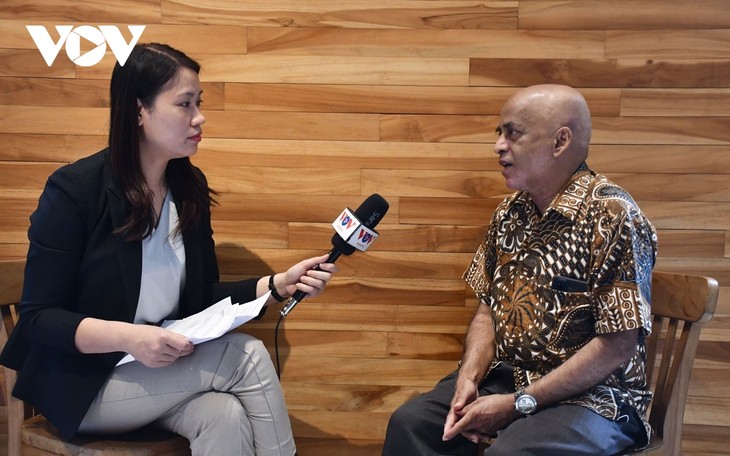(VOVWORLD) - The New Zealand-based Human Rights Measurement Initiative (HRMI) recently released its annual report on the state of global human rights in 2024, evaluating quality of life, safety from the state, and empowerment. Unfortunately, the organization’s statement saying that Vietnam's human rights situation is deteriorating is groundless and does not reflect the actual situation of human rights in Vietnam.
From its inception as the Democratic Republic of Vietnam, now the Socialist Republic of Vietnam, Vietnam has recognized human rights as inseparable from national rights.
Reality diverges significantly from HRMI's assessments
The principle of considering people both the goal and the driving force of national development, industrialization, and modernization is embedded in the Party's platforms, guidelines, policies, and state laws. Following the 1946, 1959, 1980, and 1992 Constitutions, the 2013 Constitution represents the pinnacle of constitutional guarantees of human rights, dedicating 36 out of 120 articles to human rights and citizen rights and obligations. The adoption of the 2013 Constitution with a chapter solely dedicated to "Human rights, citizen rights and obligations", along with numerous related legal documents, embodies Vietnam's efforts to create a robust legal framework for ensuring human and civil rights.
Associate Professor Dr. Tuong Duy Kien, Director of the Institute of Human Rights at the Ho Chi Minh National Academy of Politics, said: @The 1992 Constitution mentioned human rights in only one article, but the 2013 Constitution has an entire chapter on human rights. Human rights are also integrated into many other chapters of the Constitution, especially Article 3, which discusses the state's role and responsibilities in recognizing, respecting, ensuring, and protecting human rights. This demonstrates the Party and State's commitment to improving the legal system to protect human rights."
In Vietnam, citizens enjoy freedom of speech, press, belief, religion, assembly, association, and the right to complain and denounce, among other democratic freedoms. However, exercising these freedoms must not infringe on the rights and interests of other individuals, organizations, or the State. Violations are subject to legal consequences based on the nature, extent, and impact of the infringement.
Associate Professor Dr. Nguyen Canh Thin, Deputy Director of the Institute of Non-Traditional Security at Hanoi National University, said: "We encourage and create favorable conditions for people to express their views and opinions in a constructive manner. Pointing out shortcomings is different from attacking or provoking with the intent to distort."
Regarding HRMI's criterion on the right not to be sentenced to death, it should be noted that Vietnam is not the only country that still applies the death penalty. International law does not prohibit the death penalty. International Conventions on civil and political rights stipulate that the death penalty can only be applied for the most serious crimes in countries where it has not been abolished.
Dinh Tien Dung, Deputy Director of the Department of External Relations Information at the Ministry of Information and Communications, said: "Many countries, including Vietnam, which are fine-tuning their judicial system, are considering the implementation of the Protocol on the Abolition of the Death Penalty. Vietnam is taking this into consideration and reducing the number of crimes subject to the death penalty in the Criminal Code, from 44 in the 1985 Criminal Code to 18 in the 2015 Criminal Code."
International acknowledgment
Vietnam's efforts to ensure human rights have been recognized internationally. Australian Ambassador to Vietnam Andrew Goledzinowski observed improvements in education and training and better access to clean water and education for ethnic minorities. Women are more respected and increasingly contribute to society and participate in the political system. Vietnam has made great efforts to ensure human rights for its people, he said.
 Veeramalla Anjjaiah, a Senior Research Expert at the Center for Southeast Asian Affairs Research in Indonesia (Archive photo: VOV) Veeramalla Anjjaiah, a Senior Research Expert at the Center for Southeast Asian Affairs Research in Indonesia (Archive photo: VOV) |
Veeramalla Anjaiah, a Senior Research Expert at the Center for Southeast Asian Affairs Research in Indonesia, also acknowledged Vietnam's progress. He said Vietnam has achieved remarkable results in protecting human rights, particularly in promoting socio-economic development for the benefit of its people and has made significant progress across all sustainable development goals (SDGs), with an overall SDG score of 72.76.
"In recent years, Vietnam has successfully implemented numerous socio-economic development programs, which have contributed to ensuring human rights in these areas. Notably, Vietnam's achievements in eradicating hunger, reducing poverty, and improving the quality of life stand out as exemplary efforts in ensuring human rights," said Veeramalla Anjaiah,
The measurable achievements Vietnam has made in human rights, along with the positive assessments of others in the international community, strongly suggests that the HRMI annual report on Vietnam's human rights situation is unfounded.